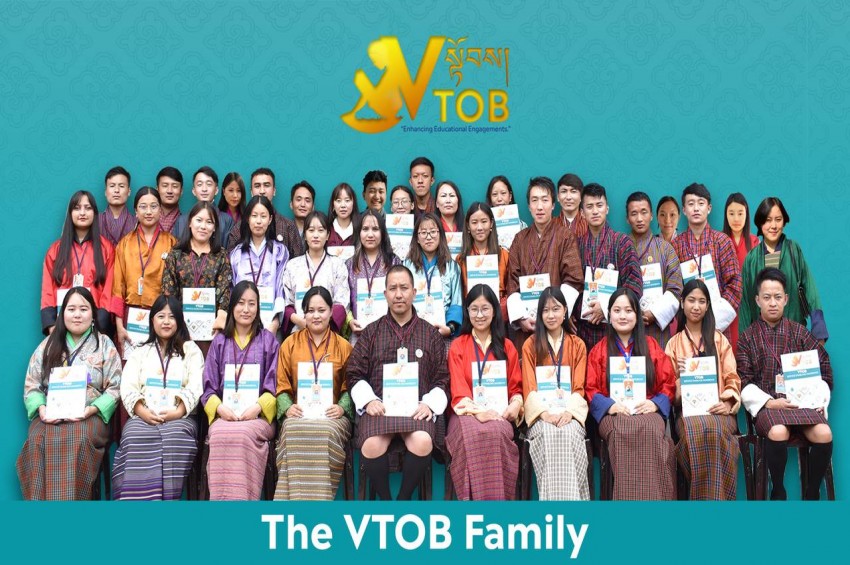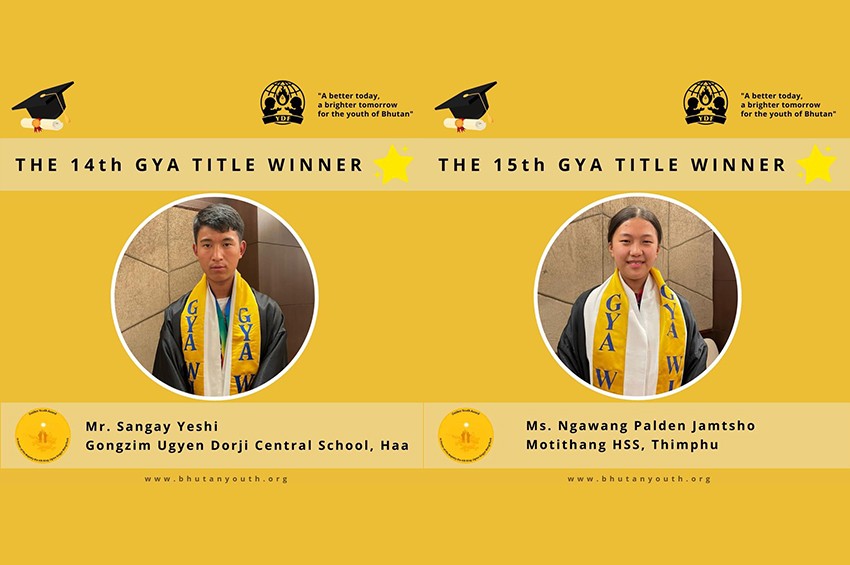Visa rejections expected to increase further with temporary freeze on education loan
The way to Australia- the most preferred country for the majority of Bhutanese to study and earn a decent living is getting rougher with increasing visa rejection. To add more thorns, T-Bank freezing student loans on Friday as a temporary measure only created panic among the Bhutanese trying to obtain the visa.
More than hundreds of Bhutanese cramped T-Bank facilities tried their luck obtaining an education loan, filing their application at the last moment as the Bank’s decision came without a warning.
Jamyang, one of the applicants at T-bank on Friday claimed that they should have been given a window time frame to process the application. Jamyang and his spouse got an offer letter from the University they chose to study in. He said, “The bank accepted hundreds of applications attached with the offer letter that day and I am praying that they sanction the education loan so that I can pay the fee and get my COE (confirmation of enrolment) from the university.”
An education consultancy firm said that the temporary freeze in student loans will impact those Bhutanese with weaker financial backgrounds. Usually T-bank and Drunk Punjab National Bank (Druk-PNB) sanctions Nu 3.5 million (M) and students pay about 11 percent interest rate to the bank.
“The trend of calling education and skill development loans as ‘show money’ could be one simple reason, making it sound fishy,” said a visa applicant.
“Now that the central bank notified the banks to stop issuing education loans, more students applying for Australia and Canada will have insufficient funds resulting in more visa rejection,” said a consultant.
According to a consultancy firm, the student-visa applicant must reflect the source of tuition fee in their SOP. Reflecting that they are acquiring loans from financial institutions, makes it easier and secure for visa verification.” With no financial support, only wealthy Bhutanese and Bhutanese with wealthy sponsors might be able to fulfill their dream to study overseas,” said the consultant.
As a ripple effect chain, many consultancies, ticketing agents and SOP writers in the country fear losing their clients. “We might risk losing our livelihood as a consultancy firm operator,” said the manager.
Another consultant expects the rise in private money laundering business with the financial institution restricted from sanctioning loans. “But such firms might charge higher interest rates,” said the consultant.
The other alternative people would explore is to look for a sponsor with the required amount of money in the bank for no less than two years. It is expected that the visa will be granted with a much stricter verification process. If the student and their spouse borrow huge amounts of money from their friends and families, the consultancy firms expect the immigration department in Australia to suspect some fishy game behind. “So many questions on bank transaction detail are often asked, increasing the risk of visa rejection,” said an agent.
Once the Australian immigration department rejects the visa, it becomes harder for the Bhutanese citizen to apply for visa until the cooling off period that normally lasts between 2-3 years. “Once your visa is rejected, it becomes difficult when you apply next time unless you have a strong supporting document,” said the consultant.
The consultant also said that it looks all rosy when we upload the visa grant pictures and stories of couples on our Facebook pages like it happened instantly. “The documentation work is hectic, most of the consultancies offer services such as notarizing marriage certificate, birth certificate, academic certificate, driving license or any certificate.”
Likewise, hundreds more are waiting to make OSHC (Overseas Student Health Cover) payment. An applicant Pema said, “OHSC incurs extra money more than what’s actually required because we need to buy and make payments Australian dollars (AUD) from the Bhutanese in Australia paying a higher exchange rate.” Health insurance coverage fees are usually paid through Bhutanese people living in Australia. Minimum of AUD 5,000 is paid for OSHC for a couple amounting more Nu 300,000 depending on currency conversion rate.
Meanwhile, some are a step ahead with document notarization process-another lengthy and a hectic path to Australian dream at the district court. When all is done in a few months’ time, then the people process with the visa lodge.
After the visa lodge, one must seek medical appointment for health check-up and biometric. According to Karma, with the national referral hospital being the only authorized hospital in the country to carry out health checkups, people from 20 Dzongkhag wait for another few months to process that. “Because too many people are on a waiting list and it takes more than two months, visa arrival gets delayed. With the delay in visa arrival, our cost only escalates as student loan repayment defers.”
To save time and energy many prefer to get their work done through education consultancies. However, with increasing occasions of visa rejection, most of the consultancies suggest Bhutanese students applying for diploma courses. A general manager at one of the consultancy firms said that not many Bhutanese students understand why their visa is rejected.
Another consultant said, “Most of the Bhutanese students earlier wanted to study diploma courses in Australia because of the lesser tuition fee. Depending on their course subject, diploma students pay between 500,000-600,000, whereas degree bachelors pay Nu 700,000 to Nu 900,000 tuition fee and students studying masters’ courses pay between Nu 800,000- Nu 1,000,000.”
The recent trend of visa rejection also shook the confidence among the Bhutanese students. Some claimed that their consultancies gave them no proper reason for visa rejection.
Another education consultancy in Thimphu said that with the rise in visa rejection cases in the market, their consultancy provides counselling services particularly when an applicant’s language proficiency test score is low. “If our client still wants to take risks and apply for diploma courses, we suggest foundation programs like graduate diploma or diploma leading to advanced diploma.”
The consultant said that the rejection is not only for the Bhutanese students. Even many Nepali students were not granted visas in recent days. Many speculate insufficient funds, lower language proficiency marks, government-to-government intervention and many more. “No consultancy firm in the country could spell out the exact reason for the visa rejection. I believe only Australian immigration knows the exact reason,” said a manager at the education consultancy firm.
Bhutanese students lose about Nu 100,000 to 200,000 if their visa gets rejected. Moreover, they only get 90 percent of their tuition fee refund from the university.
The way to Australia- the most preferred country for the majority of Bhutanese to study and earn a decent living is getting rougher with increasing visa rejection. To add more thorns, T-Bank freezing student loans on Friday as a temporary measure only created panic among the Bhutanese trying to obtain the visa.
More than hundreds of Bhutanese cramped T-Bank facilities tried their luck obtaining an education loan, filing their application at the last moment as the Bank’s decision came without a warning.
Jamyang, one of the applicants at T-bank on Friday claimed that they should have been given a window time frame to process the application. Jamyang and his spouse got an offer letter from the University they chose to study in. He said, “The bank accepted hundreds of applications attached with the offer letter that day and I am praying that they sanction the education loan so that I can pay the fee and get my COE (confirmation of enrolment) from the university.”
An education consultancy firm said that the temporary freeze in student loans will impact those Bhutanese with weaker financial backgrounds. Usually T-bank and Drunk Punjab National Bank (Druk-PNB) sanctions Nu 3.5 million (M) and students pay about 11 percent interest rate to the bank.
“The trend of calling education and skill development loans as ‘show money’ could be one simple reason, making it sound fishy,” said a visa applicant.
“Now that the central bank notified the banks to stop issuing education loans, more students applying for Australia and Canada will have insufficient funds resulting in more visa rejection,” said a consultant.
According to a consultancy firm, the student-visa applicant must reflect the source of tuition fee in their SOP. Reflecting that they are acquiring loans from financial institutions, makes it easier and secure for visa verification.” With no financial support, only wealthy Bhutanese and Bhutanese with wealthy sponsors might be able to fulfill their dream to study overseas,” said the consultant.
As a ripple effect chain, many consultancies, ticketing agents and SOP writers in the country fear losing their clients. “We might risk losing our livelihood as a consultancy firm operator,” said the manager.
Another consultant expects the rise in private money laundering business with the financial institution restricted from sanctioning loans. “But such firms might charge higher interest rates,” said the consultant.
The other alternative people would explore is to look for a sponsor with the required amount of money in the bank for no less than two years. It is expected that the visa will be granted with a much stricter verification process. If the student and their spouse borrow huge amounts of money from their friends and families, the consultancy firms expect the immigration department in Australia to suspect some fishy game behind. “So many questions on bank transaction detail are often asked, increasing the risk of visa rejection,” said an agent.
Once the Australian immigration department rejects the visa, it becomes harder for the Bhutanese citizen to apply for visa until the cooling off period that normally lasts between 2-3 years. “Once your visa is rejected, it becomes difficult when you apply next time unless you have a strong supporting document,” said the consultant.
The consultant also said that it looks all rosy when we upload the visa grant pictures and stories of couples on our Facebook pages like it happened instantly. “The documentation work is hectic, most of the consultancies offer services such as notarizing marriage certificate, birth certificate, academic certificate, driving license or any certificate.”
Likewise, hundreds more are waiting to make OSHC (Overseas Student Health Cover) payment. An applicant Pema said, “OHSC incurs extra money more than what’s actually required because we need to buy and make payments Australian dollars (AUD) from the Bhutanese in Australia paying a higher exchange rate.” Health insurance coverage fees are usually paid through Bhutanese people living in Australia. Minimum of AUD 5,000 is paid for OSHC for a couple amounting more Nu 300,000 depending on currency conversion rate.
Meanwhile, some are a step ahead with document notarization process-another lengthy and a hectic path to Australian dream at the district court. When all is done in a few months’ time, then the people process with the visa lodge.
After the visa lodge, one must seek medical appointment for health check-up and biometric. According to Karma, with the national referral hospital being the only authorized hospital in the country to carry out health checkups, people from 20 Dzongkhag wait for another few months to process that. “Because too many people are on a waiting list and it takes more than two months, visa arrival gets delayed. With the delay in visa arrival, our cost only escalates as student loan repayment defers.”
To save time and energy many prefer to get their work done through education consultancies. However, with increasing occasions of visa rejection, most of the consultancies suggest Bhutanese students applying for diploma courses. A general manager at one of the consultancy firms said that not many Bhutanese students understand why their visa is rejected.
Another consultant said, “Most of the Bhutanese students earlier wanted to study diploma courses in Australia because of the lesser tuition fee. Depending on their course subject, diploma students pay between 500,000-600,000, whereas degree bachelors pay Nu 700,000 to Nu 900,000 tuition fee and students studying masters’ courses pay between Nu 800,000- Nu 1,000,000.”
The recent trend of visa rejection also shook the confidence among the Bhutanese students. Some claimed that their consultancies gave them no proper reason for visa rejection.
Another education consultancy in Thimphu said that with the rise in visa rejection cases in the market, their consultancy provides counselling services particularly when an applicant’s language proficiency test score is low. “If our client still wants to take risks and apply for diploma courses, we suggest foundation programs like graduate diploma or diploma leading to advanced diploma.”
The consultant said that the rejection is not only for the Bhutanese students. Even many Nepali students were not granted visas in recent days. Many speculate insufficient funds, lower language proficiency marks, government-to-government intervention and many more. “No consultancy firm in the country could spell out the exact reason for the visa rejection. I believe only Australian immigration knows the exact reason,” said a manager at the education consultancy firm.
Bhutanese students lose about Nu 100,000 to 200,000 if their visa gets rejected. Moreover, they only get 90 percent of their tuition fee refund from the university.

















